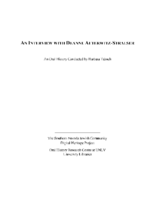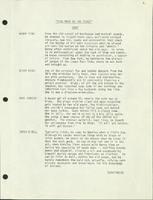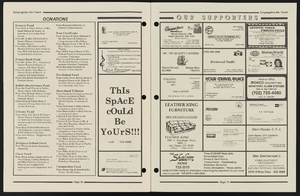Search the Special Collections and Archives Portal
Search Results

Transcript of interview with Gene Segerblom by Layne Karafantis, February 7, 2009
Date
Archival Collection
Description
Interviewed by Layne Karafantis; Genevieve "Gene" Segerblom contributed in a multitude of ways to her home of more than fifty years--Boulder City, Nevada. She is a third-generation Nevadan and was born in Ruby Valley, Nevada, in 1918. Gene and her future husband Clifford moved from Reno where they both had attended the University of Nevada, Reno to Boulder City in 1940. After they came back from Panama in 1948 where Clifford had a photographing assignment, she ran a day care center and did freelance writing of articles about the Nevada landscape with her husband providing the photographs. Gene taught high school in Boulder City. She was elected city councilwoman in Boulder City in 1979. Gene served four terms in the State Assembly from 1993 to 2000. Her grandfather was a state senator and her mother was an assemblywoman. Today her son Richard "Tick" Segerblom serves in the State Assembly, so they are the only family to have had four generations serve in the Nevada legislature. She was involved in the creation and restoration of the Boulder City Hotel and Museum and was involved in the American Association of University Women, the Boulder City Chamber of Commerce, and the Community Club. Gene did charity work for other groups. too. The theater in the Boulder Dam Museum was named the Segerblom Theatre in her honor. She passed away on January 4, 2013, at the age of 94.
Text

Transcript of interview with Mindy Unger-Wadkins by Barbara Tabach, October 28, 2015
Date
Archival Collection
Description
In this interview, Unger-Wadkins discusses growing up in Las Vegas? close-knit Jewish community in the 1960s and 1970s, and involvement with various Jewish youth organizations and activities. She also describes her career in public relations, reflecting upon the unique challenges faced when interacting with the public, and with politics, in her positions. Unger-Wadkins ends by describing her current work in land development, particularly the history of the Three Kids Mine and the technical and political process of ensuring the land is suitable as a residential area.
Text

Transcript of interview with Deanne Alterwitz-Stralser by Barbara Tabach, November 1, 2014
Date
Archival Collection
Description
Interview with Deanne Alterwitz-Stralser with contributions from her son Daryl Alterwitz on November 1, 2014. In this interview Deanne talks about her Jewish upbringing near the Illinois-Indiana state line, meeting her first husband Oscar, with whom she had four children, and the difficulties with keeping kosher. The family moved to Las Vegas from Gary, Indiana for opportunities in the furniture business. Daryl weighs in on his father's personality, business decisions, and their move to Las Vegas. They discuss the location of the store the Alterwitz's bought (Walker Furniture) and purchasing the building from Jackie Gaughan, and the different tastes in furniture in Las Vegas. Then they talk about the Jewish community and the division between the east and west sides.
On New Year's Day, 1931, Deanne Alterwitz-Stralser was born Deanne Friedman in Hammond, Indiana, the daughter of an insurance salesman and a stay-at-home mom. Deanne spent her childhood in Calumet City, just across the state line in Illinois, and was raised with a strong Jewish identity. At the age of sixteen, she met her first husband, Oscar Alterwitz, at an Alpha Zadik Alpha (AZA) dance in Gary, Indiana, and the two were married in 1950. Deanne and Oscar settled in Gary, where they had four children?Aimee, Larry, Daryl and Linda?and took over the Alterwitz family furniture business. Eventually, the couple grew the business to three successful retail furniture stores. However, a decline in the city's safety and opportunities forced the Alterwitz's to consider relocating, and in 1973, after a family vote, Deanne and Oscar moved their family to Las Vegas. Upon arrival, Deanne and Oscar bought Walker Furniture from original owners, George and Ruth Walker. Deanne used her artistic eye and training from the Art Institute of Chicago to lead the design and merchandising elements of the business. Socially, Deanne integrated into the local Jewish community, and ensured her children participated in Jewish life as well. Deanne and Oscar's children still remained involved in Walker Furniture operations, including Daryl, who serves as the company's general counsel; Larry, who is the company's president; and a daughter who now oversees the store's design and merchandising.
Text

Transcript of interview with Janellen Radoff by Barbara Tabach, September 26, 2016
Date
Archival Collection
Description
Jane Radoff?s sophisticated eye and creative energy follow her wherever she goes. Her interior designs have anonymously touched most all who have walked through many of the Strip casinos and hotels. Her working partnership with interior designer Roger Thomas for Steve Wynn properties are among the most iconic of recent era. Born 1940 in Pittsburgh, PA, to Adelaide and Meyer Sachs, Jane was destined to lead a colorful life. Her mother was a local radio/TV personality with her own show and her father was successful real estate entrepreneur. Jane attended the University of Michigan where she honed her design skills. Before moving to Nevada, Jane?s career path included Restaurant Associates, a short stint as a girl Friday for Johnny Carson, and freelance product design while starting a family. Then in 1978, her husband William ?Bill? Radoff accepted a purchasing director position from Billy Weinberger and Neil Smythe at Caesars. With her signature wry humor, she reflects on her early observations of Las Vegas, and eventually working with Roger Thomas. In time, the duo worked together to bring groundbreaking interiors to the Strip, primarily with Steve Wynn. As most Jewish transplants, the Radoffs first belonged to Temple Beth Sholom. Later she was the interior inspiration for Congregation Ner Tamid where Jon Sparer did the architectural design. She is a quiet icon of Las Vegas?s turn to elegance and warmth in design of public spaces.
Text

Transcript of interview with Jacqueline Baskow by Barbara Tabach, October 24, 2016
Date
Archival Collection
Description
In 1976, Jacqueline "Jaki" Baskow was an aspiring actress when she and a friend accepted an invitation to worked in a movie studio in Las Vegas. She had three-hundred dollars to her name, a dream and lots of dynamic energy. Though the movie studio offer did not quite materialized as she hoped - the invitation had come from Batman co-creator Bob Kane - Jaki's trajectory into Las Vegas, working with talents and planning events became an over forty year career. In this interview, she talks about growing up Jewish in Camden, New Jersey where her father was a murder victim; her tenacious effort to find the perpetrator included the help of celebrity detective Joe Schillaci. She shares stories of the colorful array of A-list entertainers she has worked with to build her successful business, Baskow and Associates. She has built a niche of handling large corporate events, hiring talent and attention to details for exciting events. She reflects on the people and moments that impelled her on; mentors such as Bobby Morris and Frank Sinatra and Jilly Rizzo.
Text

Interview with Henry Eloy Peluaga, April 22, 2005
Date
Archival Collection
Description
Text

Interview with Corbin Harney, July 24, 2006
Date
Archival Collection
Description
Text

Interview with Corbin Harney, August 4, 2005
Date
Archival Collection
Description
Text

Script for television pilot, This Must Be the Place by Hank Henry and Bill Willard, 1950s
Date
Archival Collection
Description
The preface and script for a sitcom television show conceived of by Hank Henry and Bill Willard "to evoke the spirit of fun and laughs springing out of conflict and understanding between the old comedy school and the new school."
Text

